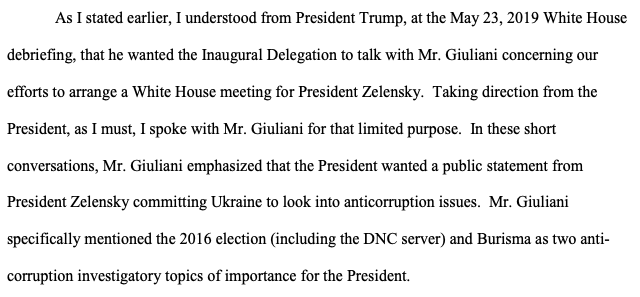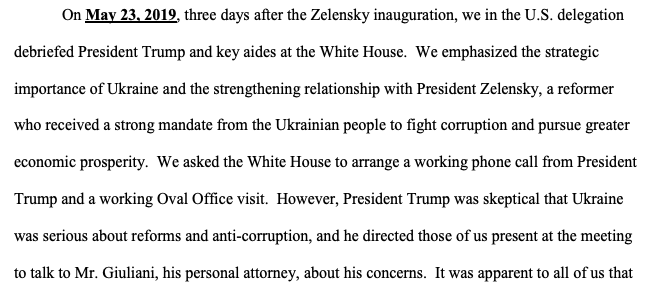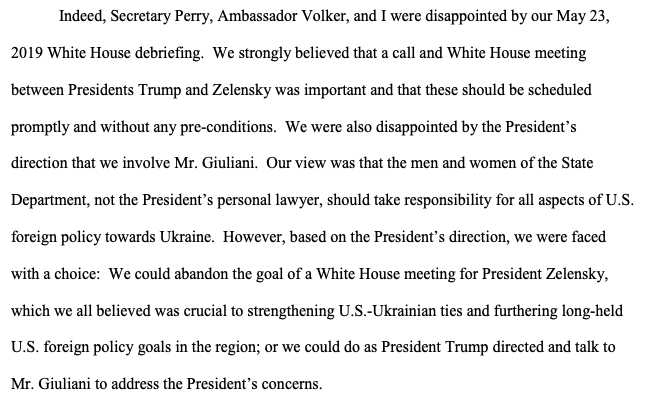Gordon Sondland and Mick Mulvaney Confirmed Trump’s Abuse of Power. One did it behind closed doors; the other, from the White House podium.
The Trump administration has given up on trying to pretend Trump’s extortion of Ukraine didn’t happen. Yesterday, two administration officials—Ambassador to the E.U. Gordon Sondland and Office of Management and Budget Director and Acting Chief of Staff Mick Mulvaney—explicitly confirmed that Trump dangled a White House meeting and military aid to Ukraine as leverage to strong-arm Ukrainian President Volodymyr Zelensky to investigate Trump’s political opponent and a long-debunked conspiracy theory about the 2016 election.
Mulvaney’s confirmation occurred in the White House briefing room. Asked why Trump had chosen to withhold military aid from Ukraine, Mulvaney not only said the goal was to pressure Ukraine to investigate Trump’s conspiracy theories about the 2016 election but also explicitly confirmed that it was a quid pro quo, adding, “We do that all the time.” He only denied that Trump demanded an investigation into Biden as well—even though the White House’s own notes from Trump’s call with Zelensky clearly show he did. (Mulvaney has since tried to walk back his comments, claiming he was being misinterpreted despite multiple chances to clarify in the press conference.)
Sondland’s confirmation occurred behind closed doors. In his opening statement to the House impeachment inquiry, Sondland explicitly confirmed that Trump and his lawyer Rudy Giuliani were using a White House meeting as leverage to strong-arm Ukrainian President Volodymyr Zelensky to investigate a company tied to one of Trump’s political opponents and a conspiracy theory about 2016 election interference.
The rest of Sondland’s testimony appears to be a straight “know-nothing” defense. He claimed to not recall events six times in his opening statement. He also claimed he didn’t know that Burisma was connected to Biden, despite multiple New York Times stories about Rudy Giuliani’s efforts to generate investigations by the Ukrainian government into Biden and the 2016 election. He also claims to have not known that military assistance was part of the bargain, even though Senator Ron Johnson claims Sondland called him in July to discuss that aspect of the extortion scheme, a claim Sondland has not denied as of the date of this publication.
Sondland spelled out the quid pro quo (p. 13).

Sondland makes it clear that Trump and Giuliani wanted a “public statement from President Zelensky” committing to look into “anticorruption issues” before Trump would meet with him. Sondland also confirms that, by “anti-corruption issues,” Giuliani meant investigating Burisma, a company Giuliani has explicitly linked to the Bidens, and a conspiracy theory that Ukraine intervened in the 2016 election, which Trump could use to defend himself from the fallout of the Mueller investigation.
Sondland also confirmed that Trump directed him and other U.S. officials to work through Rudy Giuliani on Ukraine (p. 7-8)


Sondland confirmed that Trump directed him and other officials to circumvent established foreign policy channels, including the State Department and the National Security Council (p. 8).
 Sondland claimed he wasn’t aware of the links between Biden and Burisma at the time. This conveniently fails to acknowledge that, on May 1 and May 9, weeks before Zelensky’s inauguration, The New York Times ran lengthy stories in which Giuliani explicitly linked the prospect of investigating Burisma to the Bidens and confirmed he was pursuing the investigation because “that information will be very, very helpful to” Trump, who he identified as “my only client.”
Sondland claimed he wasn’t aware of the links between Biden and Burisma at the time. This conveniently fails to acknowledge that, on May 1 and May 9, weeks before Zelensky’s inauguration, The New York Times ran lengthy stories in which Giuliani explicitly linked the prospect of investigating Burisma to the Bidens and confirmed he was pursuing the investigation because “that information will be very, very helpful to” Trump, who he identified as “my only client.”
Finally, Sondland testified that Secretary of State Mike Pompeo was in on it, too (p. 3).

Sondland’s testimony and Mulvaney’s press conference, despite his subsequent denial, confirm what has been clear all along: Trump abused his power as president to extort the Ukrainian government into acting for his personal political benefit.